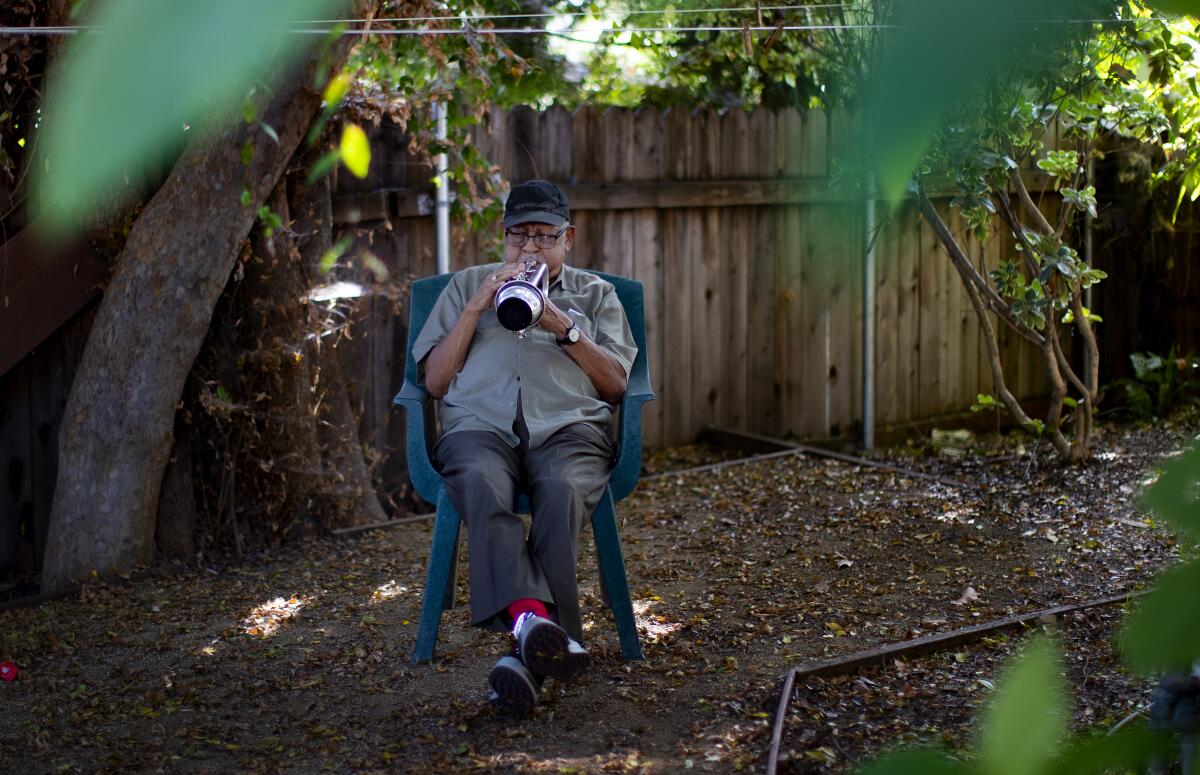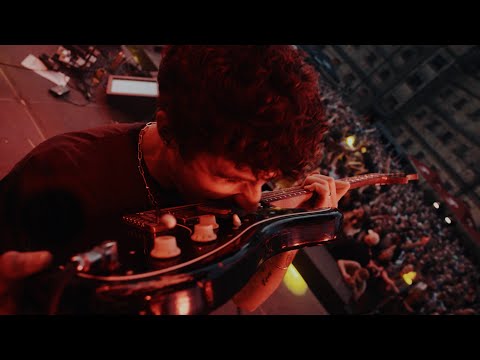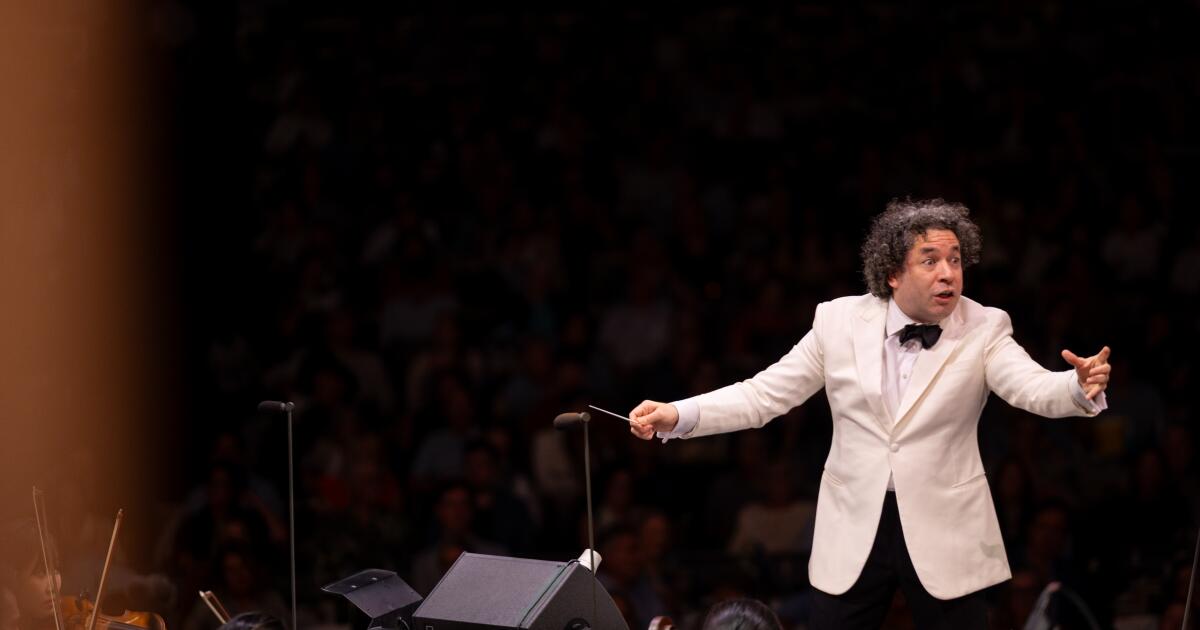L.A. jazz legend Bobby Bradford lost his Altadena home to wildfire. At 91, music is ‘all I have left’
Fifty years ago, L.A. free-jazz titan Bobby Bradford moved into a rambling, verdant house in Altadena. The cornet and trumpet virtuoso, who performed in Ornette Coleman’s band and taught jazz history at Pomona College and Pasadena City College for decades, chose the neighborhood partly because it was bustling with artists. He finally had enough bedrooms for his young family to thrive in a bucolic corner of the city with deep Black roots.
In January, Bradford’s house burned down in the Eaton fire, alongside thousands of others in his cherished Altadena. At 91, he never imagined starting his life over again in tiny rented apartments, with decades of memories in cinders.
Despite it all, he’s still playing music. (He said that while he did not receive grants from major organizations such as MusiCares or Sweet Relief, a GoFundMe and others efforts by fellow musicians helped him replace his cherished horn.)
At the Hammer Museum on Thursday, he’ll revisit “Stealin’ Home,” a 2019 suite of original compositions inspired by his lifelong hero — the baseball legend and Dodgers’ color-line-breaker Jackie Robinson, a man who knew about persevering through sudden, unrelenting adversity.
“That’s all I have left,” Bradford said, pulling his horn out of its case to practice for the afternoon. “I’m [91] years old. I don’t have years to wait around to rebuild.”
For now, Bradford lives a small back house on a quiet Pasadena residential street. It’s his and his wife’s fifth temporary residence since the Eaton fire, and they’ve done their best to make it a home. Bradford hung up vintage posters from old European jazz festivals and corralled enough equipment together to peaceably write music in the garage.
Still, he misses his home in Altadena — both the physical neighborhood where he’d run into friends at the post office and the dream of Altadena, where working artists and multigenerational families could live next to nature at the edge of Los Angeles.
“We knew who all the musicians were. Even if we didn’t spent much time all together, it did feel like one big community,” Bradford said. “We knew players for the L.A. Phil, painters, dancers.”
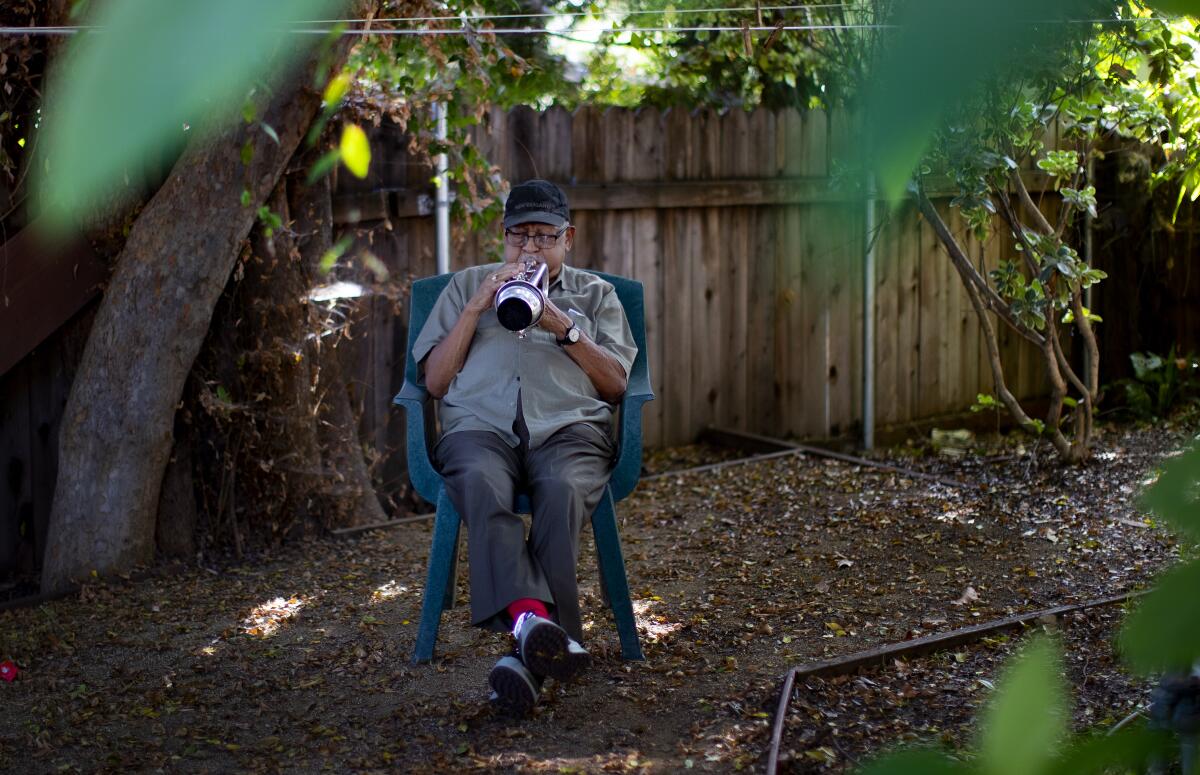
L.A.-based jazz composer/musician Bobby Bradford plays the cornet while rehearsing his original composition in his Altadena home in 2019.
(Gina Ferazzi / Los Angeles Times)
These days, there’s a weariness in his eyes and gait, understandable after such a profound disruption in the twilight of his life. He’s grateful that smaller local institutions have stepped up to provide places for him to practice his craft, even as insurance companies dragged him through a morass. “The company said they won’t insure me again because because I filed a claim on my house,” he said, bewildered. “How is that my fault?”
But he draws resilience from his recent music, which evokes the gigantic accomplishments and withering abuse Robinson faced as the first Black player in Major League Baseball. As a child in 1947, Bradford remembers listening to the moment Robinson took the field, and while he has always admired the feat, his understanding of Robinson has evolved with age.
“It was such a revelation to me as a kid, but later I was more interested in who the person was that would agree to be the sacrificial lamb,” Bradford said. “How do you turn that into flesh-and-blood music? I began to think about him being called up, with a kind of call-and-response in the music.”
The challenge Bradford gave himself — evoking Robinson’s grace on the field and fears off it — caps a long career of adapting his art form to reflect and challenge the culture around him.
With Coleman’s band in the ’50s and ’60s, and on his own formidable catalog as a bandleader, he helped pioneer free jazz, a style that subverted the studied cool of bebop with blasts of atonality and mercurial song structures. He played on Coleman’s 1972 LP “Science Fiction,” alongside Indian vocalist Asha Puthli. “Ornette played with so much raw feeling,” Bradford said. “He showed me how the same note could be completely different if you played it in a different chord. I had to learn that to play his songs.” His longstanding collaboration with clarinetist John Carter set the template for post-bop in L.A., charged with possibility but lyrical and yearning.
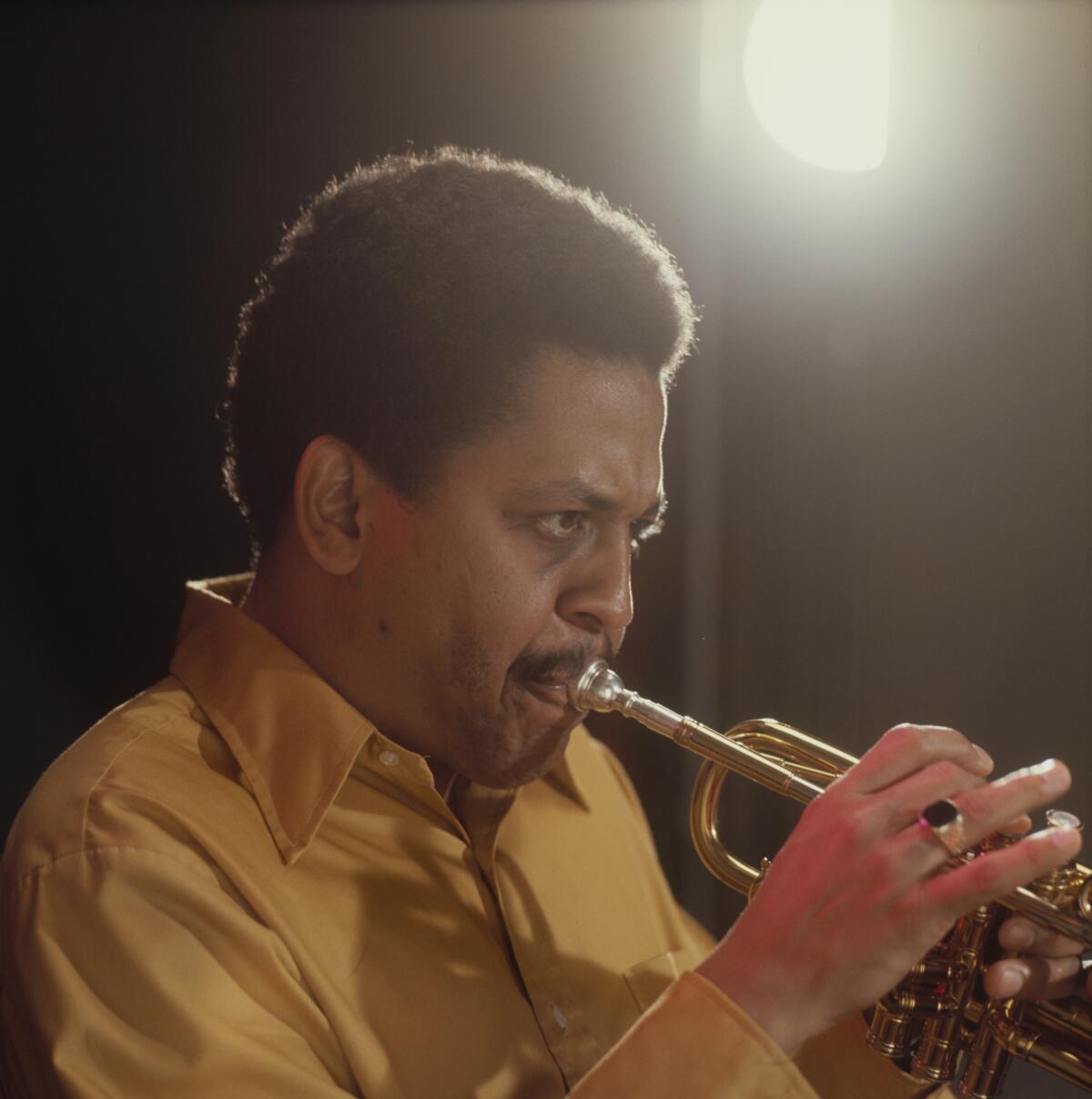
American jazz trumpeter Bobby Bradford performs onstage circa 1980.
(David Redfern / Redferns)
He’s equally proud of his decades in academia, introducing young students to centuries of the Black American music that culminated in jazz, and the new ways of being that emerged from it. At both Pomona College and Pasadena City College (where Robinson attended and honed his athletic prowess), Bradford helped his students inhabit the double consciousness required of Black artists to survive, invent and advance their art forms in America — from slavery’s field songs to Southern sacred music, to Louis Armstrong, Charlie Parker, Sarah Vaughan and into the wilds of modernity.
“You always had that one kid who thinks he knows more about this than I do,” he said with a laugh. “But then you make him understand that to get to this new Black identity, you have to understand what Louis Armstrong had to overcome, how he had to perform in certain ways in front of white people, so he could create this music.”
He’s been rehearsing with a mix of older and younger local musicians at Healing Force of the Universe, a beloved Pasadena record store and venue that reminds him of the makeshift jazz club he owned near Pasadena’s Ice House in the ’70s.
Places like that are on edge in L.A. these days. Local clubs such as ETA and the Blue Whale (where Bradford recorded a live album in 2018) have closed or faced hard times postpandemic. Others, like the new Blue Note in Hollywood, have big aspirations. He’s hopeful L.A. jazz — ever an improvisational art form — will survive and thrive even after the loss of a neighborhood like Altadena displaced so many artists. “I remember someone coming into our club in the ’70s and saying he hated the music we were playing. I asked him what he didn’t like about it, and he said, ‘Well, everything.’ I told him, ‘Maybe this isn’t the place for you then,’” Bradford laughed. “You can’t live in Los Angeles without that spirit. There are always going to be new places to play.”
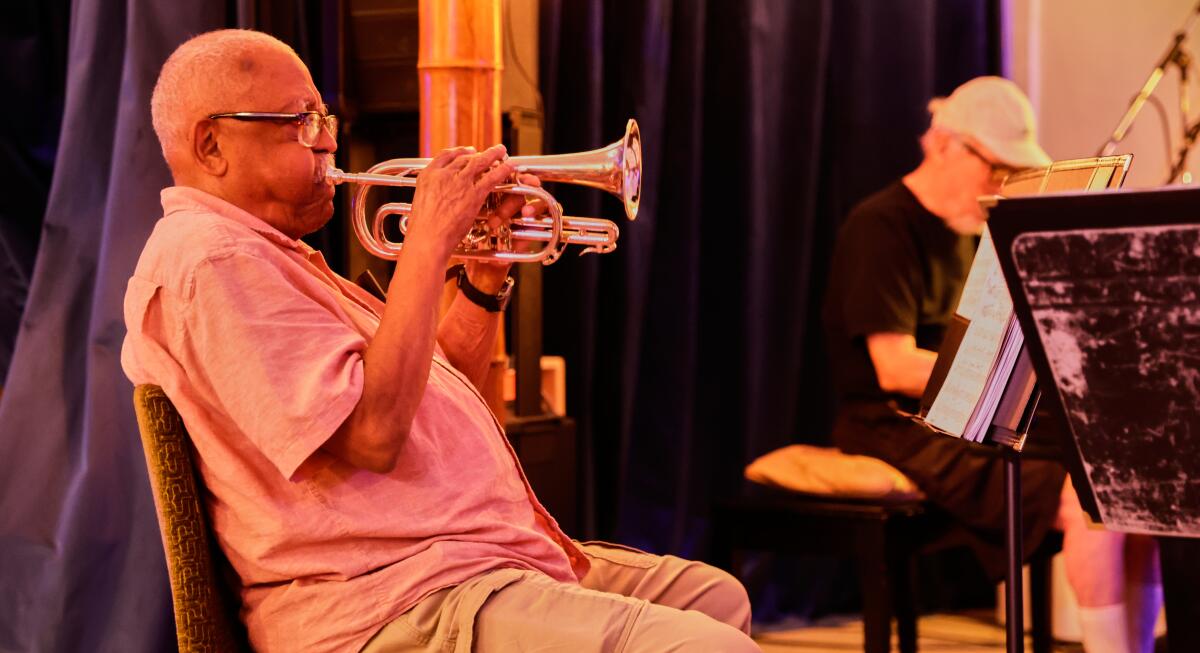
Bobby Bradford rehearses in Pasadena.
(Michael Rowe / For The Times)
He’s worried about the country, though, as many once-settled questions about who belongs in America are called into doubt under the current president. January’s wildfires proved to him, very intimately, that the most fixed points in one’s life and community are vulnerable.
Even Jackie Robinson, whose feats seemed an indisputable point of pride for all Americans, had his military career temporarily scrubbed from government websites in a recent purge against allegedly “woke” history.
“I thought we had rowed ourselves across the River Jordan,” Bradford said, shaking his head. “But now we’re back on the other side again. We thought we had arrived.”
Who knows how many years of performing Bradford has left. But as the sound of his melancholy horn arced through a sweltering Pasadena afternoon, one couldn’t help but be grateful to still have him here playing, even after losing everything.
“You know, in his first game, in three times at bat, Jackie Robinson didn’t get a hit,” he said. “Folks said, ‘Oh, it’s so sad. We told you he couldn’t play on a professional level.’ But when you dig into it, you discover that he didn’t get a hit at the game, but he laid down a sacrifice to score the winning run.”
